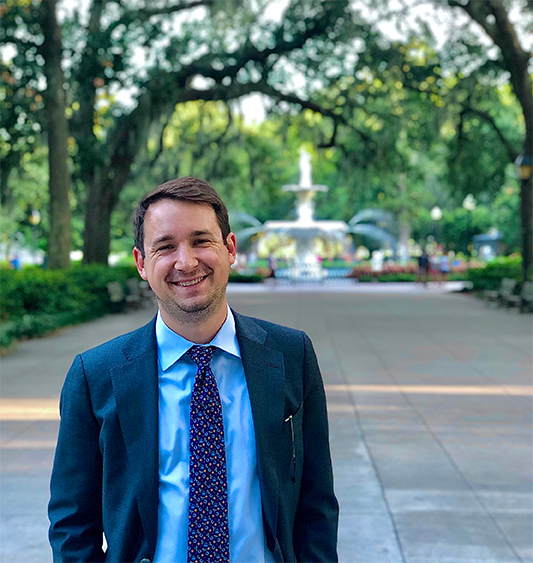 Catholic Law third-year Seton Parsons was recently published in the Montgomery Advertiser. His op-ed, “Put Grocery Tax Cuts Back on the Table in the Alabama Legislature,” describes a much-needed grocery tax cut that would save shoppers hundreds of dollars annually in grocery tax savings and add fairness to the Alabama tax system.
Catholic Law third-year Seton Parsons was recently published in the Montgomery Advertiser. His op-ed, “Put Grocery Tax Cuts Back on the Table in the Alabama Legislature,” describes a much-needed grocery tax cut that would save shoppers hundreds of dollars annually in grocery tax savings and add fairness to the Alabama tax system.
Parsons said that he originally decided to write an op-ed on grocery tax cuts in his home state’s capital newspaper for two reasons: Alabama is one of only three states that still fully taxes groceries, and “I was sure that my grandmother would see the article as a lifelong subscriber to the Montgomery Advertiser.” The piece was ultimately published statewide in The Birmingham News, The Tuscaloosa News, and online at al.com.
About the attention his op-ed has garnered, Parsons shared, “I am pleased that cutting grocery taxes is finally an issue with bipartisan consensus. Many shoppers in the past year have been forced to pay delivery fees on groceries in an effort to stop the spread of COVID-19, and poorer families need a tax break on groceries more than any other time before. Alabama is second to none in football, so why should we accept being among the last states in America to tax groceries?”
As a soon-to-be graduate of Catholic Law’s Law and Public Policy Program (LPP), it should come as no surprise that Parsons felt empowered to take an opportunity to write about affecting change at the state level. “The Law and Public Policy Institute at Catholic University provides students with the opportunity over the course of our final year in law school to develop a unique public policy proposal and learn how to advocate for its implementation. Professors Natalie Moffett and Chris Netram rendered critical guidance and critiques from experienced lawyers in the practice of public policy law. My classmates offered brilliant suggestions aimed at how to study grocery tax cuts from different angles. Finally, Alabama Arise supplied me with research materials and supplemental statistics to better understand how grocery taxes exacerbate economic inequalities by charging low-income people most of what they make on basic needs and necessities.”
On the future of grocery tax cuts, Parsons said that Alabama lawmakers have an opportunity to create a lasting legacy for future generations by taxing income instead of food. “Scripture tells us that if we have enough food and clothing, we will be content. Grocery taxes force low-income people to spend a huge part of their income just to maintain a minimal standard of living. All it takes is a willing spirit to make a difference and impact the lives of hurting people.”
Montgomery Advertiser
By: Seton Parsons
Date: April 14, 2021
Put Grocery Tax Cuts Back on the Table in the Alabama Legislature
…
This is because unlike most Americans, people in Alabama are forced to pay full sales taxes on groceries. This hurts all Alabamians, especially low and middle-income earners, who spend a large part of what they make on basic necessities just to survive. Alabama already exempts some essentials from state sales taxes, such as prescription drugs. Luxury purchases like cars and boats qualify for sales tax exemptions. Even farm animal feed is nontaxable. Yet when it comes to food for babies, seniors, and everybody in-between, Alabama fully taxes groceries without any discounts, rebates, or tax breaks.
...
